
-
Find the right food for your petTake this quiz to see which food may be the best for your furry friend.Find the right food for your petTake this quiz to see which food may be the best for your furry friend.Featured productswith Chicken, with Beef
Hill's Science Plan Puppy Multipack Wet Dog Food with Chicken & Beef are complete premium pet foods for growing puppies from weaning until 1 year old and for pregnant and nursing dogs. Your puppy will love these deliciously smooth and savoury minced loaves, formulated for balanced nutrition and overall health.
Shop NowAdult Dog FoodHill's Science Plan Adult Multipack Wet Dog Food with Chicken, Beef & Turkey are complete premium pet foods for adult dogs from 1 year. Your dog will love these deliciously smooth and savoury minced loaves, formulated for balanced nutrition and overall health.
Shop Nowwith Chicken, with BeefHill's Science Plan Mature Adult Multipack Wet Dog Food with Chicken & Beef are complete premium pet foods for mature adult dogs from 7 years. Your dog will love these deliciously smooth and savoury minced loaves, formulated to deliver the appropriate amount of energy to support the needs of adult dogs.
Shop NowFeatured products with Ocean Fish, Chicken
with Ocean Fish, ChickenTender chicken chunks in gravy for cats, with L-carnitine and fewer calories for ideal weight management. Packed with high-quality protein, omega-6s, and vitamin E for shiny fur and healthy skin.
Shop Now Mature Adult Wet Cat Food with Chicken
Mature Adult Wet Cat Food with Chicken
Tender chicken chunks in gravy for mature adult cats. Made with easy-to-digest ingredients, high-quality protein for lean muscle maintenance and antioxidant vitamins C+E for optimal health.
Shop Now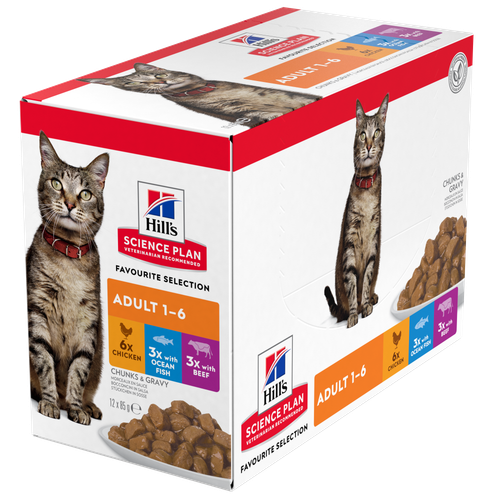 Adult Wet Cat Food with Chicken
Adult Wet Cat Food with ChickenTender chunks in gravy for cats, with high-quality protein to maintain lean muscle. With vitamin E and omega-3s & -6s for healthy skin and balanced minerals to support healthy vital organs.
Shop Now -
Dog
- Dog Tips & Articles
-
Health Category
- Weight
- Food & Environmental Sensitivities
- Urinary
- Digestive
- Joint
- Kidney
-
Life Stage
- Puppy Nutrition
- Adult Nutrition
- Senior Nutrition
Cat- Cat Tips & Articles
-
Health Category
- Weight
- Skin & Food Sensitivities
- Urinary
- Digestive
- Kidney
-
Life Stage
- Kitten Nutrition
- Adult Nutrition
Featured articles Tips For Mixing Wet And Dry Pet Food
Tips For Mixing Wet And Dry Pet FoodDiscover tips for mixing wet and dry pet food to ensure balanced nutrition and variety for your pet. For comprehensive feeding advice, visit Hill's Pet UK.
Read More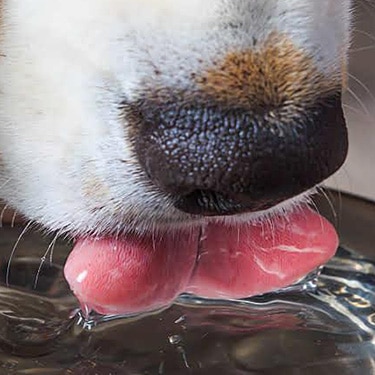 An Owner's Guide To Safe Water Sources For Pets
An Owner's Guide To Safe Water Sources For PetsEnsure your pet's hydration with our owner's guide to safe water sources for pets. For detailed tips on maintaining your pet's health, visit Hill's Pet UK.
Read More Virtual Vet Visits: What You Need to Know
Virtual Vet Visits: What You Need to KnowLearn the ins and outs of a televet appointment before you talk to a vet online.
Read More -


There are many benefits of including fruit in our own diets, but as a pet parent, you may ask yourself: can my pet eat fruit, too? If you're tempted to feed these tasty treats to your furry friend, you'll be happy to know that there is a wide range of fruit you can safely include in your pet's snack routine. Read on to find out which fruits are safe for your cat or dog.
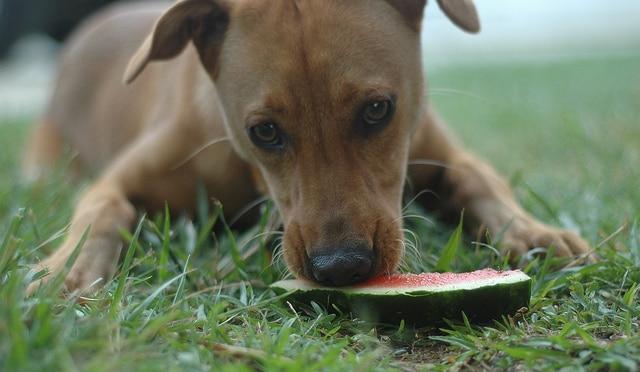
Can Dogs Eat Fruit?
The answer is yes, dogs can eat fruit, but only certain kinds of fruits and in small amounts. Moderation is the key to incorporating fruit into your dog's meals, as excessive ingestion of fruit (even safe fruit) may cause intestinal irritation, diarrhoea or bloating. Additionally, be sure to remove any choking hazards, such as ball-shaped pieces of fruit, seeds, pits, and stems, as some of these can be toxic.
Here are some safe fruits for dogs, including recommended portion sizes. The PDSA recommends cutting these fruits into bite-sized pieces to avoid choking, and choosing plain options to keep sugar intake down. All foods below should be discussed with your veterinarian before giving to your dog.
- Apples (1-2 slices): High in fibre and protein, this fruit is a great source of vitamins A and C. Do not feed your dog the core because the seeds contain a substance that can release cyanide.
- Apricots (1 slice): It's a yummy, sweet treat, but carefully and completely remove the leaves, stem and pit prior to serving because these are toxic to dogs, cats and horses.
- Bananas (1-2 pieces): These are rich in potassium and carbs, but also high in sugar, so feed them to your dog in very small amounts.
- Blackberries (2-3 berries): Full of antioxidants and fibre, this berry also packs vitamins A, C, K and E.
- Blueberries (2-3 berries): This berry has strong antioxidant properties and is considered a superfood for humans and dogs.
- Cantaloupe (1 piece): This melon contains beta-carotene, a pigment that makes it orange, and which aids in the improvement of vision.
- Cranberries (1-2 tablespoons): Cook this berry in water (and no other ingredients) before serving it to your dog.
- Kiwis (1/2 slice): In addition to fibre, kiwis provide vitamin A and potassium.
- Mango (1-2 slices): Before serving this exotic fruit to your pet, peel it and remove the pit to avoid digestive issues. The pit is toxic.
- Peaches (2-3 pieces): Skip the canned version (too much sugar) and opt for the fresh fruit, with the toxic pit carefully removed, for a treat that's high in vitamin A.
- Pears (2-3 pieces): Pears are high in fibre and copper. Choose chunks of the whole fruit and remove the core and seeds, which are toxic.
- Pineapples (2-3 pieces): Raw, fresh pineapple is a wonderful sweet treat. Cut off the prickly skin before serving.
- Strawberries (1/2 berry): This yummy berry contains vitamins B1 and B6, helpful for your dog's muscles.
- Watermelon (1 slice, seedless): Because it's 92% water, this melon is a go-to for humans and dogs to prevent dehydration when temperatures rise.


Tasty Tips
Young pets may need several visits in their first year for vaccinations. Adult pets generally benefit from annual check-ups, while senior or special-needs pets might require more frequent visits.
Can Cats Eat Fruit?
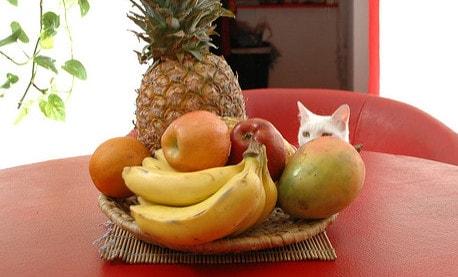
The Animal Trust says that cats can enjoy some fruits as an occasional treat or snack. On hot days, chilled pieces of fruit from the fridge can help your cat to cool down and stay hydrated. Remember to cut the fruit up into small, easy-to-eat pieces to avoid choking.
The following fruits are safe for cats and should be prepared in the same way as those for dogs:
- Apples (peeled apples may be easier to digest)
- Bananas
- Blueberries
- Strawberries
- Cantaloupe
- Seedless watermelon
What Fruits to Avoid with Dogs and Cats
Some fruits can be toxic to your pet and may cause serious health risks, so it's very important to double-check with your veterinarian before sharing your fruit salad. The following fruits should not be given to your dog or cat:
- Cherries: The cherry pit contains cyanide, which is toxic to dogs and can be lethal.
- Grapes and raisins: These foods can cause serious digestive issues in your pet, including diarrhoea, vomiting, and lethargy. They may even cause acute kidney failure in cats and dogs, notes The Animal Trust, so it's important to keep them away from your little furry friends.
- Green Tomatoes (yes, we're considering them a fruit!): Red ripe tomatoes are usually healthy for pets, but some green tomatoes contain toxins that can make pets sick, so it is always best to consult your veterinarian first.
Also, remember that it is very important to consider your pet's overall diet. It is recommended that any food outside your dog's primary nutrition, including fruit, should make up no more than 10% of their overall calorie intake. If your dog or cat is already eating a well-balanced diet, make sure that you don't overdo it with feeding them fruit, even if it is a nutritious treat.
Can dogs eat fruit? Can cats eat fruit? Absolutely — if it's a safe fruit and eaten in moderation. However, it’s important to remember that some fruits are not healthy for dogs and cats with certain medical conditions, so it’s essential to check with your veterinarian before introducing any new foods into your pets' nutrition
If you're looking to add some variety to your pet's snacks, you have many safe options from which to choose. Just as you do when searching for the right dog food or right cat food, watch your pet closely when feeding them any new food item, and contact your vet with any questions.
Bon appétit!


Christine O'Brien is a writer, mom, and long-time cat parent whose two Russian Blues rule the house. Her work also appears in Care.com, What to Expect, and Fit Pregnancy, where she writes about pets, pregnancy, and family life. Find and follow her on Instagram and Twitter @brovelliobrien.
Related products
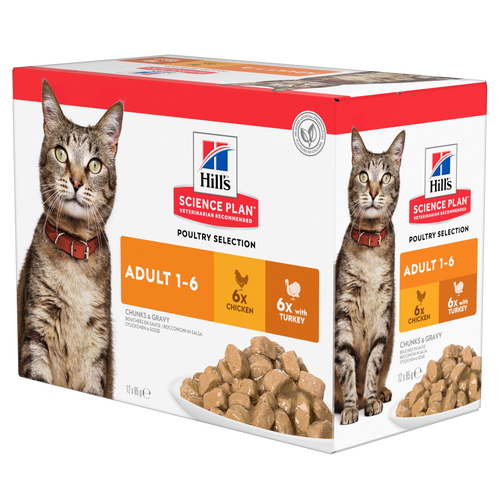
Hill's Science Plan Adult Cat Premium Chunks in Sauce with Turkey is a complete pet food for adult cats aged 1-6 years

Tender chicken chunks in gravy for mature adult cats. Made with easy-to-digest ingredients, high-quality protein for lean muscle maintenance and antioxidant vitamins C+E for optimal health.

Tender chicken chunks in gravy for cats, with L-carnitine and fewer calories for ideal weight management. Packed with high-quality protein, omega-6s, and vitamin E for shiny fur and healthy skin.

Tender chunks in gravy for cats, with high-quality protein to maintain lean muscle. With vitamin E and omega-3s & -6s for healthy skin and balanced minerals to support healthy vital organs.
Related articles


When it's time to return to school or work full-time, learn helpful tips to avoid pet separation anxiety & help your dog or cat feel safe when you're gone.



Put your pet on a diet without them knowing
Our low calorie formula helps you control your pet's weight. It's packed with high-quality protein for building lean muscles, and made with purposeful ingredients for a flavourful, nutritious meal. Clinically proven antioxidants, Vitamin C+E, help promote a healthy immune system.
Put your pet on a diet without them knowing
Our low calorie formula helps you control your pet's weight. It's packed with high-quality protein for building lean muscles, and made with purposeful ingredients for a flavourful, nutritious meal. Clinically proven antioxidants, Vitamin C+E, help promote a healthy immune system.

